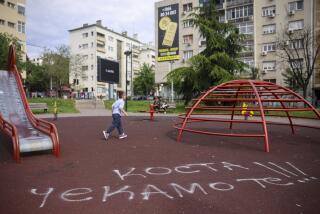Serbia Tries to Distance Self From Troops : Bosnia: Diplomats and military experts dismiss the move as a transparent maneuver to escape blame. They say it will do nothing to quell the violence.
- Share via
BELGRADE, Yugoslavia — Bankrupt by war and threatened with international censure, the Serbian leadership of Yugoslavia on Tuesday sought to distance itself from federal army units rampaging against independent Bosnia-Herzegovina.
Army shelling of Sarajevo was so heavy Tuesday that armored personnel carriers could not make their way through the firestorm until nightfall to bring U.N. Undersecretary General Marrack Goulding into the Bosnian capital to mediate.
Bosnia’s predominantly Muslim territorial defense force has given the army until midnight tonight to withdraw.
But the federal presidency in Belgrade announced that it was calling on ethnic leaders in Bosnia to take over command of most of the 100,000 or more federal troops deployed in the republic.
While the move may create the illusion that Belgrade does not support the fighting that has killed hundreds in the past two months, diplomats and military experts dismissed it as a transparent maneuver to escape blame and said it would do nothing to quell the violence.
Army officers claimed last week that 80% of the troops in Bosnia were citizens of that republic and would therefore be expected to stay on, even if the federal army withdrew from the conflict.
The army is now almost exclusively Serbian, so the majority of troops left behind would likely join tens of thousands of Bosnian Serb rebels and volunteer guerrillas from Serbia fighting to wrest territory from the secessionist republic. The tanks, guns, troop transports and aircraft in the hands of federal soldiers in Bosnia would also presumably be handed over to the Serbian militias.
“Obviously, what this means is a changing of uniforms and a changing of flags, but from the military point of view it doesn’t mean a thing,” said Milos Vasic, military affairs specialist for the independent weekly magazine Vreme. “The troops will be under the flag of the so-called Serbian Republic of Bosnia-Herzegovina, but they will remain under the control of Belgrade.”
Soldiers whose homes are in Serbia or Montenegro--which together recently proclaimed a new, smaller Yugoslav state--will be withdrawn within 15 days, the presidency said in a statement distributed by Tanjug news agency. But Belgrade claims those “Yugoslav” forces account for less than 20% of the troops in Bosnia.
The presidency said it is relinquishing responsibility for the troops so “unwanted situations and consequences would be avoided” in Bosnia, which much of the Western world now considers an independent country.
Besides officially sidestepping blame for the deadly crisis consuming Bosnia, the move to cut direct ties with the federal troops there could provide other political bonuses for Belgrade. Residents of Serbia are beginning to feel the effects of hyperinflation and collapsing industrial production, both brought on by almost a year of war that has funneled 90% of federal resources to the massive army that no longer has much of a federation to defend. (Of the original six republics, only Serbia and tiny Montenegro remain united.)
It was unclear whether Belgrade would clandestinely bankroll the army in Bosnia, as it did rebel Serbs in Croatia throughout last year’s fighting there. That warfare cost at least 10,000 lives and made 600,000 homeless. Since fighting flared in Bosnia after a Feb. 29 referendum endorsing secession, the refugee wave has soared to more than 1 million.
Goulding, the U.N. envoy, eventually reached Sarajevo to discuss with Bosnian authorities the possibility of expanding the U.N. Protection Force that is deploying 14,000 peacekeepers in neighboring Croatia. Radio Sarajevo said that shells fell within yards of the armored convoy he traveled in.
Bosnia’s predominantly Muslim leadership has appealed for U.N. intervention, as well as for other foreign military assistance to deter what it claims is “illegal aggression” by the Yugoslav army.
More to Read
Sign up for Essential California
The most important California stories and recommendations in your inbox every morning.
You may occasionally receive promotional content from the Los Angeles Times.














